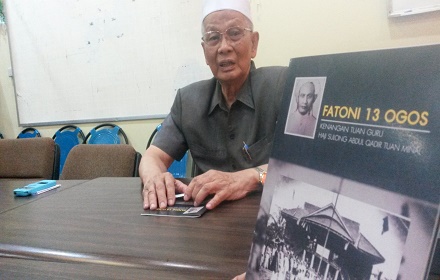Den Tohmeena proposes recipe for peace in Deep South
The name of Haji Sulong bin Abdul Kadir is still being mentioned occasionally these days in the context of the southern unrest problem even though he has been missing for 61 years since 1954.

The fact is that he is still being held in high respect as a spiritual leader by the Malay people in the southernmost provinces. He used to demand the government then for the right of self-determination for the Malay people and, for that matter, was accused of being a rebel.
On August 14 this year, the children and grand children of Haji Sulong got together at the house of former deputy interior minister Den Tohmeena to hold a ritual in his remembrance. About 400 people attended the event, including local government officials.
The event was the second of its kind held for Hajji Sulong, said the missing man’s son, Mr Den. The first was held on September 30 last year.
Mr Den told his guests that the event was held so that the children and grand children of Mr Haji Sulong would not forget his father and the good deeds he had performed and there were no political motives whatsoever.
He said his former surname was Tuanmeenan but eventually the surname was shortened to Meenan and “Toh” was added to become Tohmeena. Toh was referred to someone of high respect by the local Malay people.
He disclosed that one of the official documents referred to Hajji Sulong as a Thai national of Malay descent.
Referring to the unrest situation in the Deep South, the former deputy interior minister blamed all Thai governments for not being sincere to resolve the unrest problem. He added that he missed Pol Col Thawee Sodsong, former secretary-general of the Southern Border Provinces Administration Centre, for his sincerity and determination to resolve the problem.
Mr Den said that the unrest problem would never be resolved and violence would persist if the region is not given the right of self-determination.
He said that his father used to propose seven demands to the government over 60 years ago and the BRN also made five demands in their peace talks with the government of Prime Minister Yingluck Shinawatra.
He insisted that all the 12 demand are not against the Constitution and if they are accepted by the government, peace will eventually return to the region.
However, he pointed out that conflict between the hawkish faction of the military and the dovish faction poses an obstacle to peace in the region. He cited the case of one religious teacher or ustaz who was asked by Datoh Seri Ahmad Zamzadin, the Malaysian facilitator of peace talks to invite him to Kuala Lumpur.
He said he accepted the invitation and went to KL to meet the facilitator who asked him to inform the Patani people about the peace process and to invite all the separatist groups to attend the talks.
Upon his return from KL, he disclosed that the religious teacher who approached him was found shot dead. He said he felt very sorry for his death.
Haji Sulong’s seven demands are as follows:
- The people of Yala, Pattani, Narathiwat and Satun must have the right to elect a representative who shall have the full powers to administer the four provinces, to appoint or remove any officials in the region.
- Local officials in the four provinces must comprise 80 percent Muslims.
- Thai and Malayu languages are recognized as official languages.
- Malayu language is used in the teaching of students in primary education.
- Islamic law must be applied in Sharia court which is separated from ordinary courts.
- All the taxes collected in the four provinces are used in the provinces.
- There must be a Muslim committee in charge of all affairs of the Muslim people and answerable to the elected administrator.
The BRN’s demands include: Malaysia must be recognized as the mediator and not facilitator; peace talks between the people of Patani represented by the BRN and the Thai government; there must be witnesses to the peace talks from Asean, OIC and other non-governmental organizations; unconditional release of all detainees of security-related charges and revocation of all arrest warrants; recognition of BRN as a liberation movement and not a separatist group.
------------------------------------------------------------------------------------------------------------------------
Caption : Den Tohmeena
